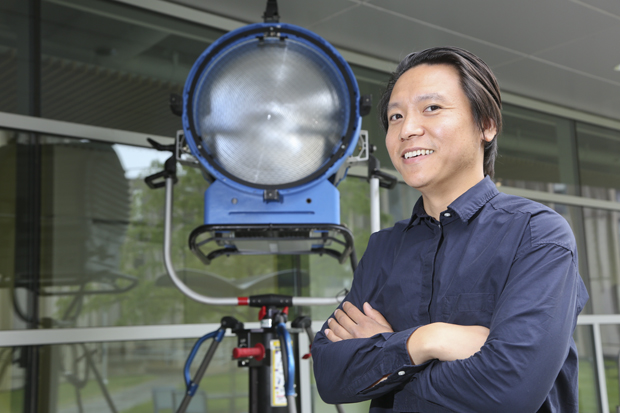Jimmy Luc '08: In action before "Lights, camera..."
Long before a movie director calls “action,” Luc has helped identify the places that fit the plot
 Photo/Mike Lovett
Photo/Mike LovettJimmy Luc '08 works as a location manager and scout in the Boston film industry
Over the past six years, Luc has worked on more than a dozen movies or television shows filmed in Massachusetts. He is currently working as a location manager and scout. Long before a movie director calls “action,” Luc has helped identify the places that fit the plot, negotiated with property owners and neighbors, and made sure the scene is ready for “action” — all while accommodating the people for whom that setting is real life, not moviemaking.
“You try to give directors and producers options, because what you conceptualize from the script might not be what the designer or director sees,” he said. “And then you have to make sure the location works for everybody — the director and producers and the people who normally work or live there.”
One project required him to find an old-fashioned drugstore soda fountain; he improvised by finding an ice cream shop that could be designed to look like a drugstore. Another project involved filming at three different high schools to create one fictional high school. Still another required him to find a reasonable facsimile of the Kennedy compound on Cape Cod, without actually using one of the world’s best-known family beach homes.
His work recently brought him back to campus to scout locations for an upcoming David Spade movie. The Shapiro Science Center wound up as the setting for one scene, giving a glimpse of Hollywood to researchers and staff who work in the glass-sided building over the summer.
Luc double majored in economics and East Asian studies and minored in film studies. Originally he had planned to major in studio arts, but a course with Aida Yuen Wong, Nathan Cummings and Robert B. and Beatrice C. Mayer Chair in Fine Arts, opened his eyes to the possibilities of film.
In Wong’s course, “Art in the Asian City,” Luc said, “we saw a movie that really stuck with me, and I thought ‘film is really moving paintings’ and it enables people to see imagery in a different way.”
From there, Luc took courses in screenwriting, film noir and other film topics, and also began work in the then-new Getz multimedia lab with Mark Dellelo. Luc learned — and then taught other students and faculty to use — programs like Digital Performer, Final Cut, and Flash, before those programs became the industry standard.
“I really enjoyed collaborating with other people and making art that way,” Luc said. “Learning how to edit footage definitely helped me get more interested in film; everything just clicked.”
But at the beginning of the “great recession,” jobs in film were scarce, especially for new graduates. Inspired by a tip from Matthew Fraliegh, associate professor of East Asian literature and culture, Luc joined the Japan Exchange and Teaching Program. He spent two years in a small town two hours north of Tokyo, teaching English to elementary and middle-school kids and learning Japanese.
“I always liked Japanese literature from (Fraleigh’s) classes, so I thought it would be really interesting to understand the characters in the books. I wanted to experience what I was reading about and to pick up another language while I was there,” he said.
Urged by his parents to return home after the Fukushima Daiichi nuclear plant disaster, Luc returned to Boston in 2011. By then, the state tax credit for the film industry was attracting big-budget movies to Massachusetts. After forwarding his resumé to people in the industry, he landed a job on a $100 million film as a production assistant.
Working on a big-budget production gave him the opportunity to meet and work with a large number of film professionals in different departments. Most people in film try out a number of different roles throughout their career, Luc said.
“Everyone in the industry has probably started somewhere and switched to something else,” Luc said. “I think everyone in the industry is really helpful in the sense that they always want to know what you ultimately want to do, and people will give you advice to help you try to get there.”
Luc said the flexibility and nimbleness that he developed at Brandeis — along with his degree — have been helpful in navigating the Boston film-production scene.
“The university has a really good reputation. When someone asks where you studied, saying ‘Brandeis’ does elicit a positive reaction from most people — they know you’re smart,” he said.





